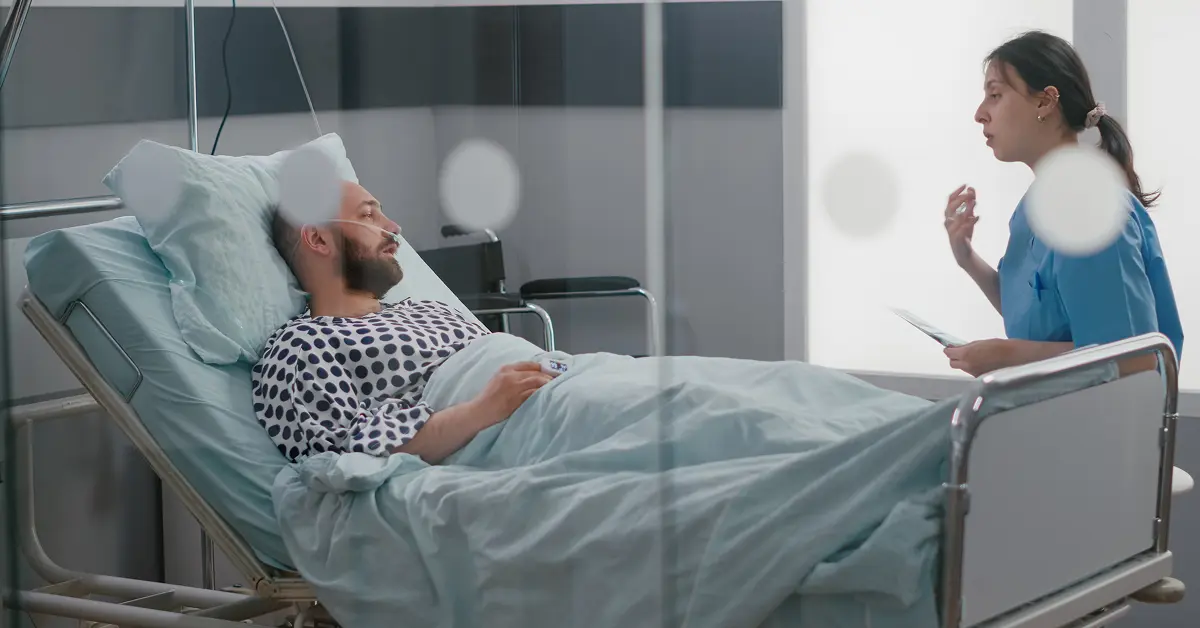When a patient is discharged from a hospital, the journey to recovery isn’t over. In fact, it’s just beginning. Hospital discharge care is a critical phase that ensures a smooth transition from hospital to home. It involves planning, support, and proper follow-up care that can significantly impact recovery, especially in India where access to consistent post-hospital care can vary. This article dives into what Hospital Discharge includes, why it matters, and how families can ensure their loved ones receive the right support after being discharged.
What Is Hospital Discharge Care?

Hospital discharge care refers to the structured process followed when a patient is released from a hospital after treatment. It includes planning and coordination of services that the patient will need to safely continue recovery at home or in another facility.
In India, this process may involve:
- Giving discharge instructions to the patient and family
- Providing prescriptions for medications
- Educating about follow-up appointments
- Arranging home care services, nursing, or physiotherapy
- Explaining warning signs of complications
- Coordinating with primary care doctors or specialists
This comprehensive care plan is essential for reducing readmissions, preventing complications, and speeding up recovery.
Why Is Hospital Discharge Care Important?
Hospital discharge care plays a pivotal role in the overall recovery and well-being of a patient. Here are some key reasons why it is so crucial:
Ensures Continuity of Care
Hospital treatment is only one phase of the healthcare journey. After discharge, the patient still needs medications, physical therapy, and sometimes nursing assistance. A proper discharge plan ensures all these needs are met, seamlessly connecting the hospital phase with the next stage of care.
Reduces Risk of Readmission
Many patients in India are readmitted due to medication errors, lack of follow-up, or post-surgical infections. Structured discharge care lowers this risk by educating patients and caregivers about symptoms to watch for and ensuring medications and treatments continue correctly.
Promotes Faster Recovery
Recovery at home can be quicker and more comfortable if the discharge process includes adequate support. Trained caregivers or nurses can monitor vital signs, assist with mobility, and offer nutritional advice—all of which contribute to faster healing.
Supports Family Members
In India, family members often become the primary caregivers once a patient is back home. Discharge care helps prepare them for this role by providing guidance, training, and resources to manage the patient’s needs effectively.
Prevents Medication Errors
One of the most common causes of readmission is incorrect medication usage. A good discharge plan involves detailed instructions on what medications to take, how and when to take them, and any possible side effects to watch for.
Manages Chronic Conditions
For patients with chronic conditions like diabetes, hypertension, or heart disease, discharge care includes setting up a routine and ensuring follow-up appointments. This helps in better long-term disease management and prevents unnecessary hospital visits.
Key Components of Hospital Discharge Care
A well-structured discharge plan in India includes the following components:
Discharge Summary and Instructions
Patients are given a written discharge summary that outlines their diagnosis, treatments received, medications, and post-discharge care instructions. This document should be kept handy for future reference.
Home Care Arrangements
If the patient needs assistance at home—such as a nurse, caregiver, or physiotherapist—these services should be arranged before discharge. In cities like Delhi, Mumbai, Bengaluru, and Hyderabad, home healthcare services are easily accessible, but in rural areas, family members may need additional training.
Follow-Up Appointments
The patient is advised to visit the hospital or consult specialists at specific intervals. These appointments are crucial to monitor progress, change medications if needed, or identify any complications early.
Diet and Nutrition Guidance
Special diets may be required depending on the condition (e.g., low salt for heart patients, high protein for post-surgery recovery). Discharge care involves giving these recommendations to the patient and family.
Physiotherapy or Rehabilitation
Post-surgery or stroke patients often require physiotherapy. Discharge care should include a therapy schedule or referral to a rehabilitation centre or at-home physiotherapy provider.
Challenges in Hospital Discharge Care in India
While the importance of discharge care is undeniable, India still faces several challenges:
- Lack of Standard Protocols: Not all hospitals have a structured discharge process.
- Low Awareness: Families often do not understand the importance of discharge instructions and may overlook crucial steps.
- Accessibility Issues: In smaller towns and rural areas, arranging post-discharge services like nursing or physiotherapy can be difficult.
- Cost Constraints: Many families may hesitate to spend on home care services due to financial limitations, risking incomplete recovery.
Tips for Families to Ensure Proper Discharge Care
Here are some practical tips for families to manage hospital discharge care effectively in India:
- Ask Questions: Don’t hesitate to clarify discharge instructions or medication schedules.
- Keep a Diary: Maintain a log of medication, symptoms, and appointments to monitor the patient’s condition.
- Use Home Care Services: Explore professional home healthcare providers for nursing, physiotherapy, or caregiver support.
- Stay in Touch with Doctors: Keep communication lines open with your doctor or specialist. Use video consultations if physical visits aren’t possible.
- Educate Yourself: Learn about the patient’s condition to identify early signs of problems and take timely action.
Role of Professional Home Healthcare Services
The rise of professional home care services in India has made hospital discharge care more effective. These services can provide:
- Skilled nurses for wound care, injections, catheter management, etc.
- Trained caregivers for daily living assistance
- Physiotherapists for rehabilitation
- Dieticians and doctors for regular health check-ups at home
With their help, families can ensure patients recover comfortably without the stress of frequent hospital visits.
Conclusion
Hospital discharge care is not just a formality; it is a vital bridge between hospital treatment and complete recovery. In India, where family involvement is high and healthcare resources are often stretched, a strong discharge care plan can make all the difference. Whether it’s ensuring medication adherence, monitoring symptoms, or arranging at-home support, each step counts toward a smoother, safer, and faster recovery.
By recognising its importance and planning accordingly, families can protect their loved ones from unnecessary complications and give them the best chance at healing—right from the comfort of their home.
Contents
Our 24*7 services
Latest Posts
- What Is Respite Care and Why Is It Important
- Affordable home care for senior citizens in India
- Caring for Seniors with Dementia or Alzheimer's at Home
- Senior Caregiving A Guide for Every Family
- How to Write a Caregiver Resume That Gets You Hired
- How Care After Hospital Discharge Speeds Up Recovery at Home
- How to Get Home Health Care for Seniors Through Medicare
- What Does a Senior Citizen Caregiver Really Do at Home
- How to Care for Elderly Parents with Alzheimer’s or Dementia
- How to Get 24-Hour Care for Seniors at Home



